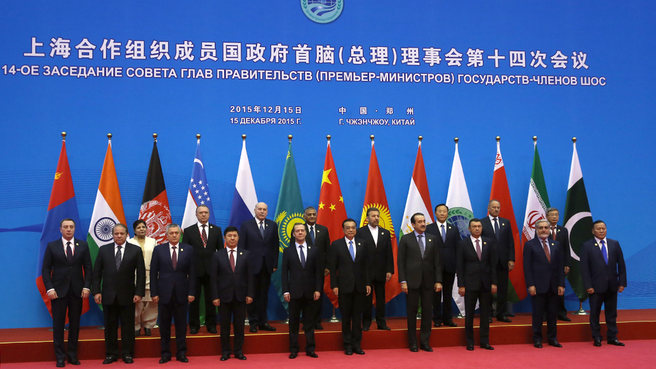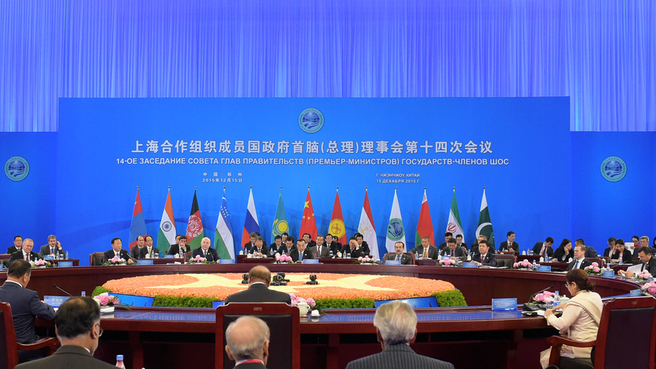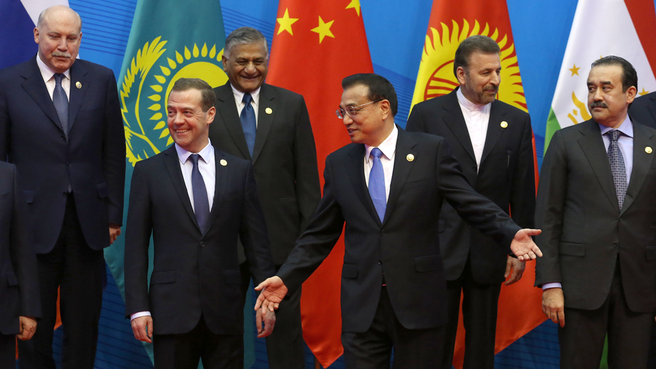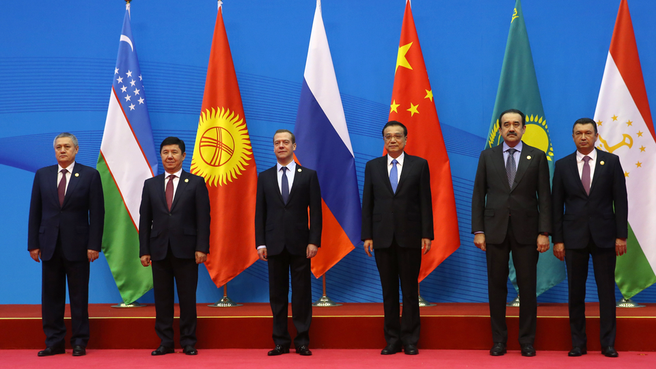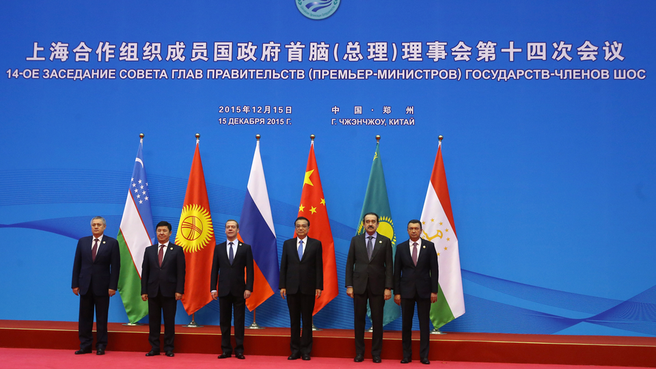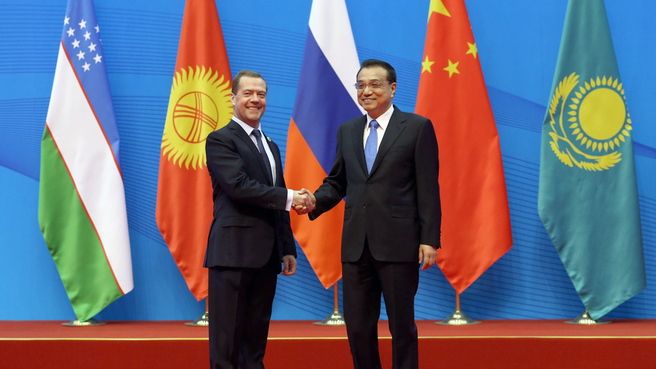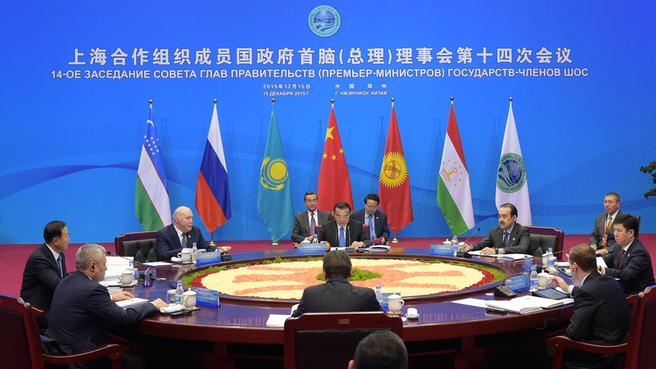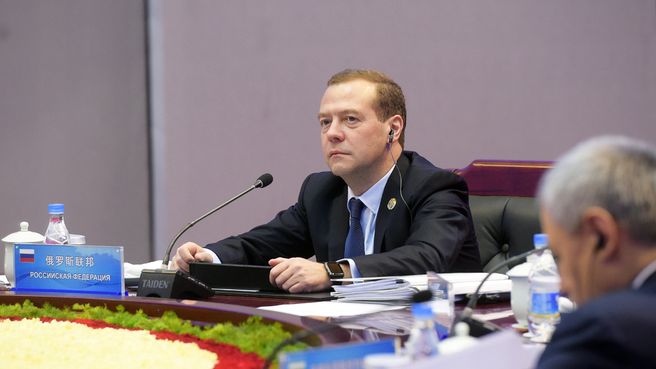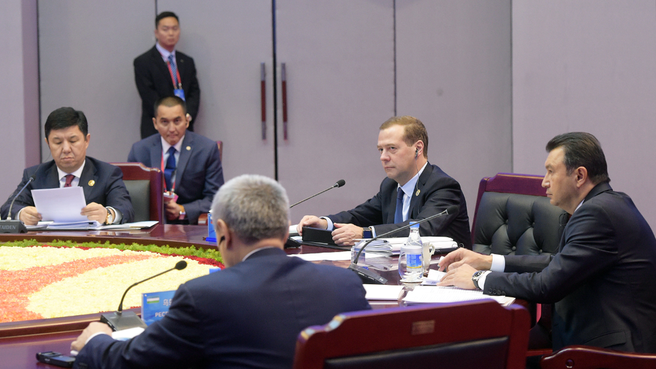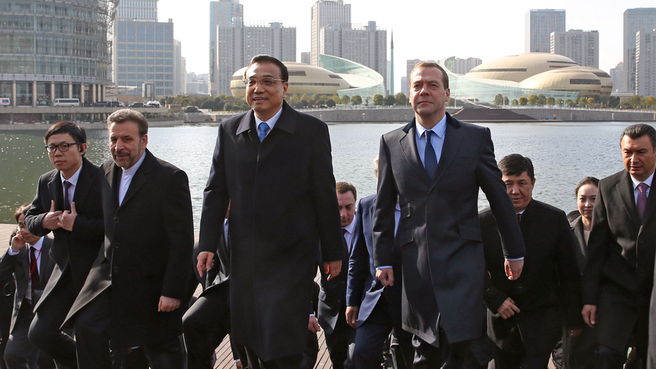Dmitry Medvedev: “Russia is proposing to start consultations between the Eurasian Economic Union and the Shanghai Cooperation Organisation, including prospective SCO countries, and the member states of the Association of Southeast Asian Nations on the possibility of creating economic partnerships based on the principles of equality and respect for mutual interests.”
From Dmitry Medvedev’s statement at the 14th meeting of the SCO Council of Heads of Government
The Shanghai Cooperation Organisation, which next year will mark 15 years since its establishment, has entered a new period of development.
The global situation, both politically and economically, is difficult and complicated. The in-depth transformation of the system of international relations is gaining momentum. Its key elements are the rise of a polycentric world order, the strengthening of the Asian influence in global development and the increasing interdependence of countries.
In these conditions it is highly important to support the current system of international law by relying on its accepted principles and the institutions that have formed its architecture, including the United Nations Organisation.
We are also facing major economic challenges that include the continued decline in international trade and investment activity. The volatility of national currencies has increased alongside the dramatic fluctuations of global energy and raw material prices. The situation has been further complicated by attempts to unbalance the architecture of international trade and to provoke the fragmentation of global economic relations, including through the creation of a system of so-called exclusive relations and all manner of partnerships. Russia is not against partnerships, such as the Trans-Pacific Partnership or any other association, but we would like to understand what will happen in the system of global trade and what future awaits the World Trade Organisation. It is of exceptional importance to know this so that we can live in a predictable world with a common code of economic behaviour.
These risks have been aggravated by new stability and security challenges in light of the growing threat of international terrorism. We are especially concerned about the situation in some countries of the region, in particular Afghanistan, a country that has a well-known mix of problems and where radical groups, including Daesh or ISIS, have been trying to gain ground. The threat is especially large in the northern provinces of Afghanistan in direct proximity to our borders. Russia supports the efforts of the government and people of Afghanistan to restore peace and to build a state that will be stable, neutral and economically sound.
This terrorist aggression is feeding off chaos and anarchy in the Middle East and North Africa. The only way to fight terrorism is through a united front, leaving ideological differences aside. The SCO has called for the building up of international efforts against terrorist groups in accordance with UN Security Council resolutions.
Economic cooperation between the SCO countries could be boosted by increasing the share of national currencies. We have launched a pilot platform at the Moscow Exchange where rouble-renminbi and rouble-tenge can be exchanged without first having to convert to US dollars. We are inviting all countries to join this initiative. We also hope that the implementation of a programme for improved interaction between the SCO countries’ customs authorities through 2021, which will be signed during this meeting, will have a positive effect on the development of mutual trade.
The implementation of large-scale multilateral projects is impossible without effective financial assistance, including easy-term loans. One of our first priorities is to create an SCO financial mechanism for this. We must decide how it could be integrated into the mechanics of similar systems such as the Eurasian Development Bank, the Asian Infrastructure Investment Bank, the SCO Interbank Association, the Silk Road Fund and the BRICS New Development Bank.
We must continue to implement our pilot projects in education, science, culture, tourism, healthcare and emergency response. One of our most successful projects is SCO University, which operates as a network of about 70 universities from the SCO countries. Another issue on our agenda is to implement the SCO Youth Council’s idea of creating the SCO Youth Card.
***
The meeting of the SCO Council of Heads of Government concluded with the signing of joint documents:
Programme of cooperation between the customs services of the Shanghai Cooperation Organisation for 2016-2021; signed by Head of the Russian Federal Customs Service Andrei Belyaninov and his counterparts from the SCO member countries.
Memorandum of understanding between the SCO Secretariat and the Secretariat of the UN Economic and Social Commission for Asia and the Pacific; signed by SCO Secretary General Dmitry Mezentsev and Dr Shamshad Akhtar, UNESCAP Executive Secretary.
Communique on the results of the Council of Heads of Government (Prime Ministers) of the Shanghai Cooperation Organisation; signed by: Premier of the State Council of China Li Keqiang; Prime Minister of Kazakhstan Karim Massimov; Prime Minister of Kyrgyzstan Temir Sariev; Prime Minister of Russia Dmitry Medvedev; Prime Minister of Tajikistan Kokhir Rasulzoda; and First Deputy Prime Minister of Uzbekistan Rustam Azimov.
Decisions of the Council of Heads of Government (Prime
Ministers) of the Shanghai Cooperation Organisation:
- On the SCO
Secretariat’s report on the implementation of the Programme of Multilateral
Trade and Economic Cooperation between the SCO Member States;
- On the
financial statement by the SCO on the execution of the SCO budget for 2014;
- On the SCO budget for 2016;
- On the efforts to create the SCO Development Bank
and the SCO Development Fund (Special Account);
- On targeted
allocation for the creation of a protected information and telecommunication
system for interaction between the competent authorities
of the SCO member states.
Signed by: Premier of the State Council of China Li
Keqiang; Prime Minister of Kazakhstan Karim Massimov; Prime Minister of
Kyrgyzstan Temir Sariev; Prime Minister of Russia Dmitry Medvedev; Prime
Minister of Tajikistan Kokhir Rasulzoda; and First Deputy Prime Minister of
Uzbekistan Rustam Azimov.
Statement by the Heads of Government (Prime Ministers) of the Shanghai Cooperation Organisation on regional economic cooperation.
